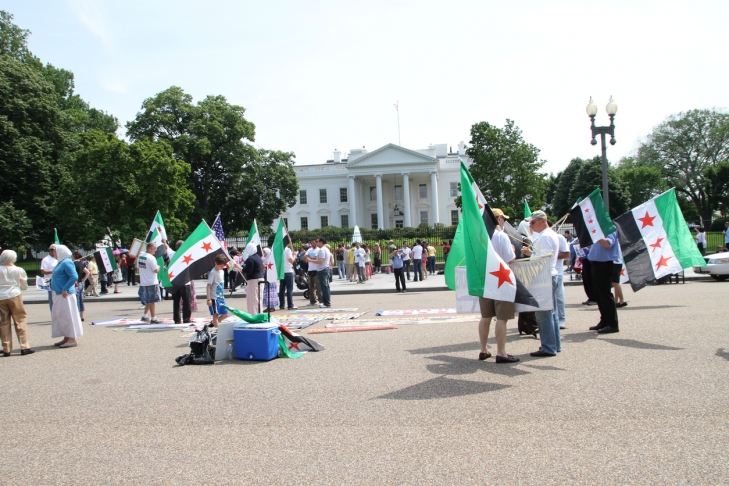
How a Syrian family dealt with war, travel bans, and reuniting in turbulent times
45-year-old Nour watched her breath condense in the late New England winter, as snow ploughs scraped over a foot (30 centimetres) of snow from Winter Storm Stella onto the bus stop sidewalk. Keeping her eyes peeled for any one of the three bus services – 74, 75, and 78 – that comes by, the mother of two did what she had done every weekday morning for the past seven months: head to the Harvard Graduate School of Education for classes.
Nour lives just 15 minutes away from the world’s most famous education institution where she is pursuing a Master’s degree. But it is nearly 9,000 kilometres and a world away from her hometown in Damascus, Syria.
“We stayed in Damascus for a year and a half after the conflict started [in 2011],” Nour tells Perspectives@SMU in a phone interview. “The trouble was not that close to Damascus in the beginning, and then it came closer. Sometimes bombings happen, sometimes kidnappings. We had no intention to leave whatsoever initially, but with kids going to school every day we felt it was safer that we leave.
“In 2012, we left Damascus for Egypt. We thought it would be for just a few months, but when the fighting in Syria lasted for longer than that we ended up staying for four years.”
Far-flung family
Her children, Abdul and Layla, are now 18 and 12, respectively. Abdul is attending college at the University of Minnesota, while Layla lives with Nour and goes to middle school in Belmont. Husband Amr is back in Damascus taking care of her parents. “We were all in Egypt until I decided to come here [in August 2016], and my husband went back to Damascus,” Nour says.
When Perspectives@SMU spoke to Nour, Amr had just visited and had left “10 days ago” to return to Damascus. Both husband and wife travel with Lebanese passports, which excludes them from President Donald Trump’s infamous travel ban that bars entry to America for citizens of six countries, including their native Syria.
“He is [worried about being denied entry] but we are lucky because we have Lebanese passports,” muses Nour. “We think he will be able to visit again, but my parents will not be able to come – they only have Syrian passports. They recently applied for a visa to visit and were rejected, and it doesn’t look like they will be getting a visa any time soon.”
Nour’s parents, both retired professors at Damascus University, used to regularly visit Colorado and Minnesota where Nour’s younger brother and sister are permanent U.S. residents. With the uncertainty surrounding the Trump administration’s immigration policy, would it make sense to have her husband in the U.S. on a dependant’s visa just in case the travel ban becomes expanded?
“He could have come with me but he couldn’t work here. It’s hard for a person to not do anything for a year, two years. He can come visit on a tourist visa whenever he wants, but a visa to come here and stay but not allow him to work would not benefit him in any way.”
As it is, hubby is back in Damascus and working on software development projects “as much as he can”. While things have improved in Damascus over the past few months, work is hard to come by amidst the ongoing political instability. Even so, it is still better than being in a foreign country, as the family did just nine months prior.
“Egyptians are friendly and supportive of Syrians,” Nour recalls of her time in the outskirts of Cairo. “We were not allowed to work [in Egypt], but since…we were both software developers, we worked on projects remotely [with an internet connection].
“We had some savings from earlier years, but it wasn’t a sustainable solution. We couldn’t have gone on like that for much longer because we were spending more than we were earning. Also, after a while, working from home became a little boring. I wanted to meet people.”
Coming to (and staying in?) America
Seven months into her nine-month Master’s programme, the soon-to-be Harvard graduate is heartened by Bostonians’ show of support for Syrians, although she concedes it “may not be representative of people across the United States”. Abdul, her son at the University of Minnesota, shares her experience of support but she concedes it may be a corollary of universities’ liberal bent. Would it be a good idea to stay in the U.S., even with a government that might not be as welcoming to immigrants?
“I’ll see if I can find something good, in which case I might stay,” Nour says while expressing a desire to return to her homeland eventually. But with the situation in Syria far from being resolved, Nour was not sure which was the better option: have her husband and parents move to America, or move the kids back to Syria.
“It really depends. Things [in Syria] have changed compared to a year ago, things have changed. I would like my parents to be able to visit, at least. What I don’t want is for us not be able to get to each other. I’m not sure I have a preference right now.
“I don’t think [the Syrian crisis] will end anytime soon. It’s become very complicated with too many stakeholders.”
Follow us on Twitter (@sgsmuperspectiv) or like us on Facebook (https://www.facebook.com/PerspectivesAtSMU)
Last updated on 27 Oct 2017 .